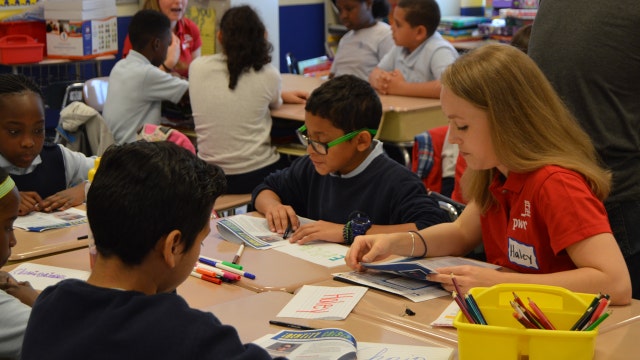How Pricewaterhouse Coopers is Fixing America's Financial Literacy Crisis
Students at the Metropolitan Lighthouse Charter School in the Bronx have the lucky opportunity to learn about financial literacy courtesy of PricewaterhouseCoopers.
In 2012, professional services firm PricewaterhouseCoopers launched a five year, $190 million initiative called Earn Your Future. The goal is to educate America’s students from elementary to high school on a variety of financial related topics like budgeting, saving, student loans and identity theft.
“If you think about the financial crisis and what potentially caused it is we have a country of people that really don’t understand the basics of finance so that’s an adult problem. So when we thought about how we could potentially solve that societal problem we said let’s start with what I’ll call early intervention let’s start getting to kids in school and explaining the basics of money to them” says Mitch Roschelle, a partner at PWC and Business Development Leader for New York.
But according to research from PWC, 78% of teachers say that they need more resources to teach financial literacy. Only 31% feel ‘completely’ comfortable teaching financial literacy and PWC found that only 12% currently incorporate personal finance into their curriculum. However, 67% of teachers feel that financial education should start in elementary school.
So that’s why PWC provides curriculum for teachers and training at the University of Pennsylvania’s Wharton school. As well, teachers are provided with a full course curriculum through Earn Your Future’s online digital lab.
And it’s not just PWC that thinks this is important. Teachers, like Katherine Ketigian at the Metropolitan Lighthouse Charter School in the Bronx, believe that teaching financial education is an essential part of school.
“It’s really important to teach students at a young age that their decisions that they make in life especially with finances can really affect the way that the rest of their life goes” says Ketigian.
And PWC’s research found that compared to Generation X teachers, 47% of Millennial teachers think that financial education should happen primarily at school, compared to 42% of non-Millennial teachers.
“Millennials are actually very concerned about financial literacy because the financial crisis really happened in their lifetime. It’s their world war. It’s something that they will remember forever so they’re very invested in trying to solve the literacy crisis as well” says Roschelle.




















